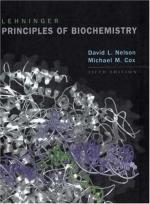|
This section contains 1,071 words (approx. 4 pages at 300 words per page) |

|
Biochemistry is the study of the chemistry of living organisms. Researchers in this area of science study life on a molecular scale. Biochemistry has its roots in biology, chemistry, and physics. It is not clear when biochemistry was first considered a separate field of science, but the synthesis of urea, an organic compound, from non-organic reactants by Friedrick Wöhler in 1828 serves as a convenient benchmark. In 1953, James Watson and Francis Crick made history when they used methods from biology, chemistry, and physics to describe the double helix structure of DNA.
Although biochemistry is a relatively young field of science, its principles have been used by humans for thousands of years. People in ancient China, India and the Mediterranean region employed biochemistry for making bread with yeast, fermenting beer and wine, and treating diseases with plant and animal extracts. However, it wasn't until the early 19th century...
|
This section contains 1,071 words (approx. 4 pages at 300 words per page) |

|


